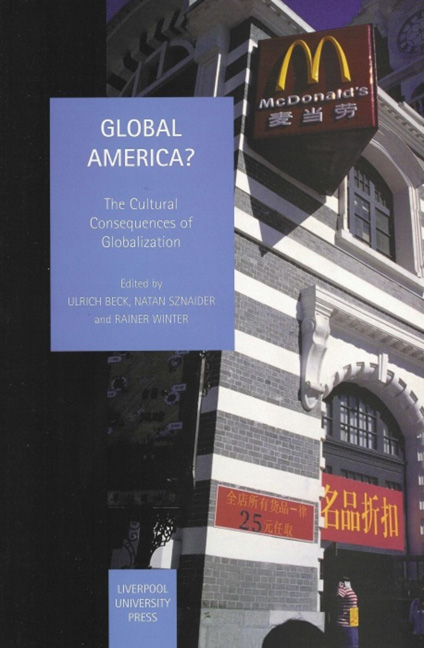Book contents
- Frontmatter
- Contents
- List of Contributors
- Acknowledgments
- Introduction
- PART I THEORETICAL PERSPECTIVES
- 1 Rooted Cosmopolitanism: Emerging from a Rivalry of Distinctions
- 2 Assessing McDonaldization, Americanization and Globalization
- 3 Culture, Modernity and Immediacy
- PART II NATIONAL CASE STUDIES
- PART III TRANSNATIONAL PROCESSES
- PART IV EPILOGUE
- Rethinking Americanization
3 - Culture, Modernity and Immediacy
from PART I - THEORETICAL PERSPECTIVES
- Frontmatter
- Contents
- List of Contributors
- Acknowledgments
- Introduction
- PART I THEORETICAL PERSPECTIVES
- 1 Rooted Cosmopolitanism: Emerging from a Rivalry of Distinctions
- 2 Assessing McDonaldization, Americanization and Globalization
- 3 Culture, Modernity and Immediacy
- PART II NATIONAL CASE STUDIES
- PART III TRANSNATIONAL PROCESSES
- PART IV EPILOGUE
- Rethinking Americanization
Summary
Reconceptualizing Cultural Globalization
In what follows I shall try to depart quite radically from a form of discourse that has, I believe, become a constricting way of talking and thinking about the cultural implications of globalization. This discourse is elaborated around the assumption, baldly stated, that cultural globalization inevitably takes the form of a spread of cultural practices – and habits, values, products, experiences, ways of life – from certain dominant places to others. We might call this general pattern of critical thought the ‘geopolitical conception of cultural influence’. It appears in particular forms in the ideas of Americanization or Westernization – ideas that are frequently conflated – as both are with the notion of the spread of global capitalism as a form of cultural imperialism.
Now it is not as though this way of thinking is necessarily in every case misguided or wrongheaded, or that the issues it foregrounds are unimportant. However, it does direct us towards thinking around a fairly familiar set of critical concerns and, moreover, within a conceptual framework that may limit the scope of understanding of emergent cultural phenomena. For even in criticizing or radically qualifying the more robust articulations of the cultural imperialism thesis, we find ourselves reproducing a style of thinking about culture in terms of these compelling spatial power metaphors: metaphors of territory and borders, of flows and the regulation of flows, of invasion and protection(ism). Even the most sophisticated cultural-critical discourses that have emerged around the ideas of hybridity or transculturation – though they challenge the implicit close mapping of culture on to nation – fail to break with the dominant imagery of cultural territories, liminalities, cross-border flows, fusions, and so forth.
Hence, the result of much recent cultural-theoretical activity has been to rescue culture from the subservient, instrumental position within which it has been placed in traditional political-economic accounts (still, it has to be said, by far the most common way in which globalization is figured), and to prise it away from its anchoring within (increasingly empirically implausible) conceptualizations of the ethnically integrated, bounded and sovereign nation state. But it has not been to detach culture sufficiently from a fundamentally territorial imagination.
- Type
- Chapter
- Information
- Global America?The Cultural Consequences of Globalization, pp. 49 - 64Publisher: Liverpool University PressPrint publication year: 2003



